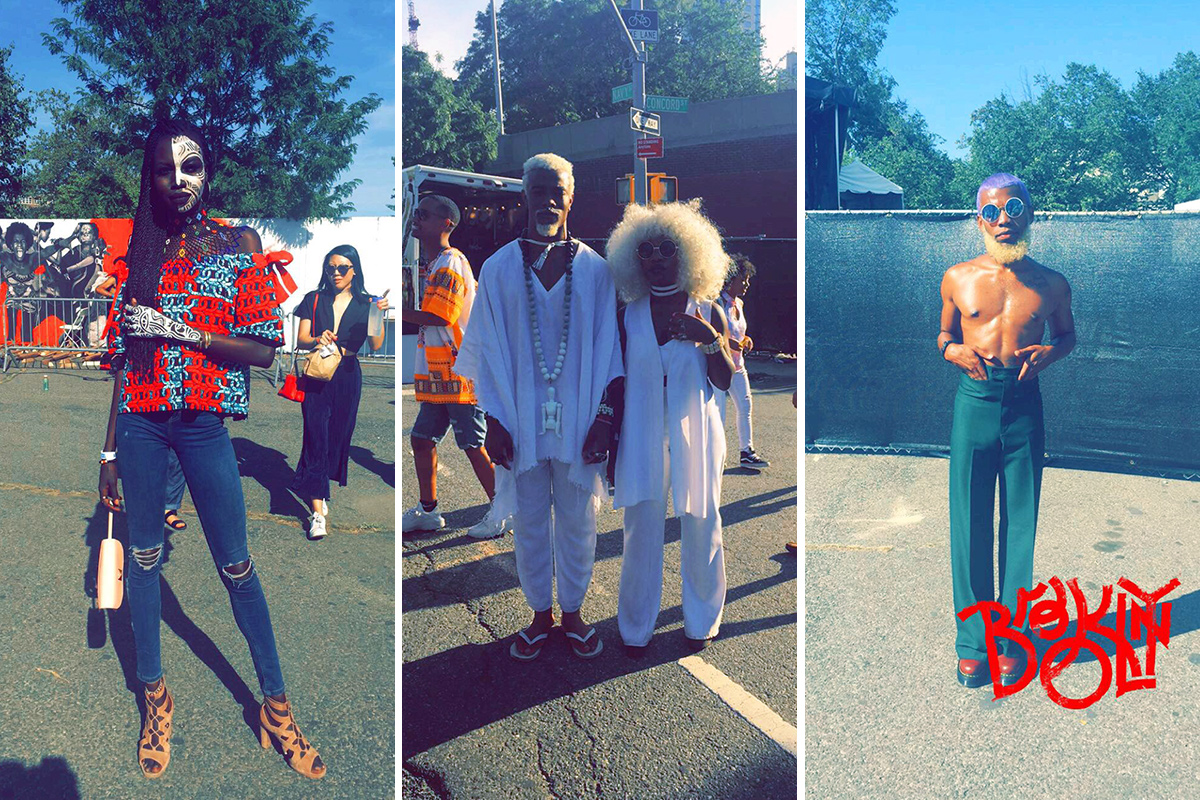Afropunk. What is it? What does it even mean?
In 2003, James Spooner released Afro-Punk, a documentary film that follows the lives of four young African Americans heavily involved in the punk music scene. Punk was a subculture vastly ignored by the black community, and the film reveals the struggle for belonging in each of his subjects. They see themselves as outsiders with nowhere to go to be themselves.
Inspired to wider action, Spooner went on to create a safe space where African American underdogs of all stripes could fully and freely express their spirit. In 2005, his Afropunk Festival debuted in Brooklyn, New York. Through the years, other locations have been added as the festival spread to the worlds of food, art, fashion, film, and other forms of music. Today, over 100,000 people attend the festivals in Atlanta, Paris, London, and Johannesburg.
I had the pleasure of attending my first festival in Brooklyn in 2016. Within minutes of my arrival, a young man with green and blue dreadlocks skipped past me barefoot holding burning sage. I stopped him and asked why he was doing this.
“It makes me feel free, and I want others to feel the same way,” he responded, capturing in a simple phrase what I later understood as the essence of the festival.
Social pressure is a powerful animal, and when we are even slightly out of the ordinary, we run the risk of being isolated, shunned, or labeled as an oddball or a freak. In the desire to be accepted, we often neglect our true selves.
But then came Afropunk.

The primary focus of the festival is to celebrate and create a safe space for eccentric people of color who express themselves through punk/rock music and style. However, since its debut, the festival has broadened to accommodate a larger, more inclusive audience: lovers of neo soul, Afrofuturism, reggae punk, trap jazz, alternative R&B, and a multitude of other music genres along with cultural groups, such as the black queer community.
Afropunk gives us the opportunity to step away from everyday society and enter a completely different world. One can escape his stuffy office cubicle, throw off his jacket and tie, and walk into a carefree world of color. A world where women don outer space-inspired makeup and wear gargantuan crystals around their necks. A place where men walk around barefoot or sport ten-inch platforms. A community that celebrates and promotes love, acceptance, freedom, individuality, art, expression, and music regardless of your background.
The movement is truly redefining what it means to be black and exposing the diversity of the African American community. Not all black people are into hip-hop, rap, graffiti, gangster images—concepts mass media has continuously pushed as the black norm. We can be into the arts, rock, metal, bluegrass, folk dancing, and futurism. We can identify as gender fluid and involve themselves in bohemian culture and style. The point is to normalize subgroups and to defy race-based generalizations.

The festival conveys the message that it is okay to express yourself in any way you like as long as it does no harm to others. It’s okay to wear a teal spiked tutu and a mini chandelier repurposed as a hat! It is perfectly fine to dye your hair hot pink, listen to music that others find unusual, and dance in public! You can make weird art, like weaving old dresses into a rope that spells out “how I pulled myself out of the patriarchy”! One should be herself unapologetically and without explanation.
Ultimately, Afropunk is not solely about being black and alternative but being able to exist in a space of total acceptance. Some of the festivalgoers show up in jeans and a T-shirt, eschewing the outlandish outfits and costumes that many others wear. It creates a feeling of inclusion.
While at the festival, I asked some attendees what Afropunk meant to them, and I received a wide variety of responses—many resonating with my own experience. One girl explained that she had dealt with loneliness throughout high school, feeling she needed to wear a public mask to avoid judgement. After her first Afropunk Festival, she felt completely okay with being herself no matter where she was. Many attendees had felt the pressure of leading a double life as an eccentric person of color, forced to fit in not only with society but with family and friends.
The Afropunk Festival brings people together, many who once felt isolated and rejected. It’s a space where people can celebrate one another through creative expression, where the camaraderie is so fulfilling that people learn to be themselves wherever they roam.
The 2018 Afropunk Festival takes place in Brooklyn August 25 and 26.

Jewel Anderson has been an intern at the Smithsonian Center for Folklife and Cultural Heritage and the National Museum of American History. She graduated from Bowie State University with a bachelor’s degree in history and a concentration in Pan-African studies, and she will begin a master’s program in museum studies at New York University.


